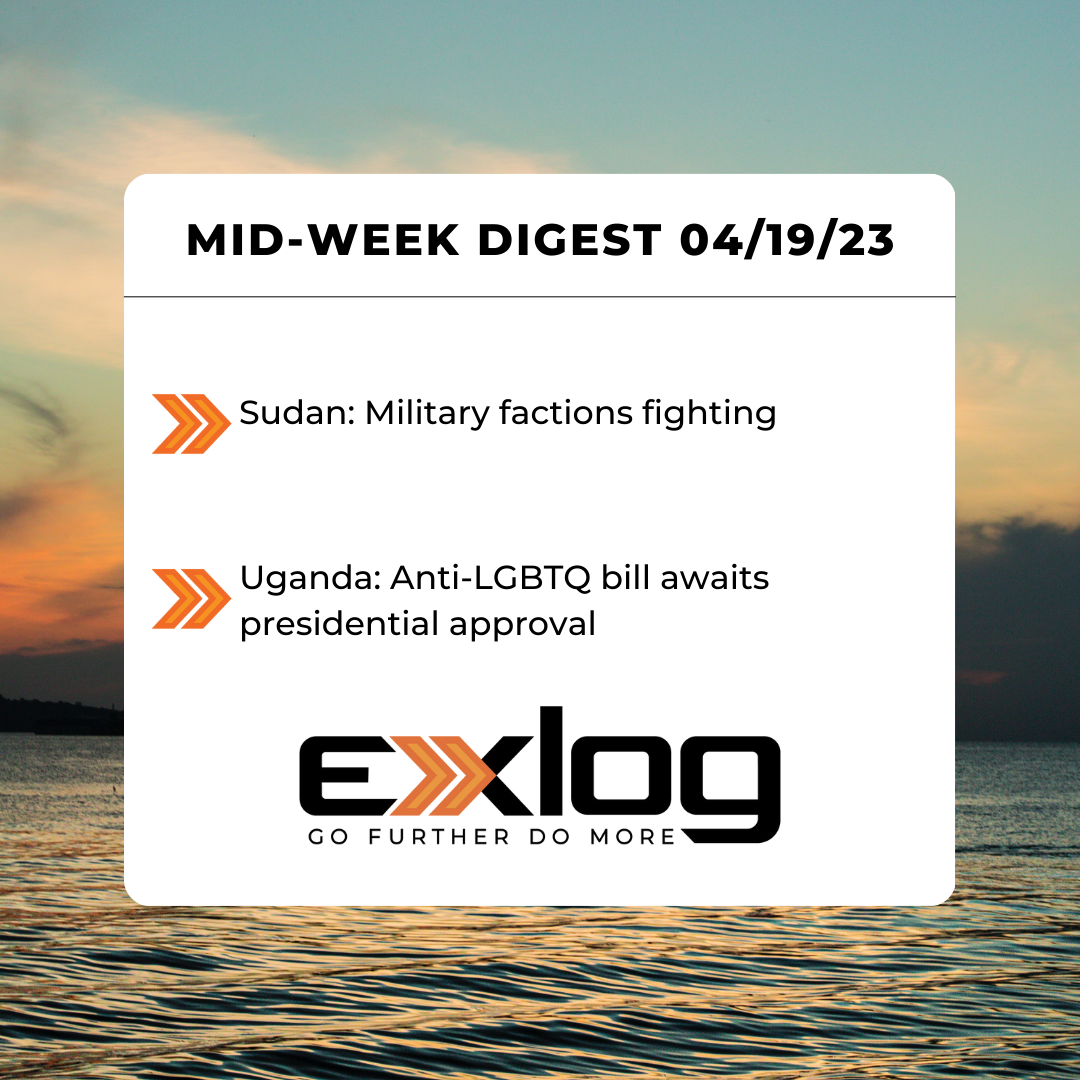Military factions fighting across Sudan and Ugandan anti-LGBTQ bill awaits presidential approval
Sudan: High casualties, mass disruption reported amid military clashes
Rival military factions battling for control of Sudan have caused five consecutive days of violence, endangering civilians and disrupting critical services. Clashes between the Sudanese Armed Forces (SAF) and the paramilitary Rapid Support Forces (RSF) began on April 15, and have continued despite two attempted ceasefires on April 16 and 17. The heaviest fighting has been reported in the capital, Khartoum, and its sister city Omdurman, with additional clashes observed in several other major cities in southwestern and eastern areas of Sudan. Within Khartoum, fighting has been especially pronounced at the north end of Khartoum International Airport (KRT) where the SAF headquarters are located, and across the Blue Nile River in the Kafouri neighborhood of North Khartoum. Both sides have used heavy artillery and airstrikes in densely populated areas; amid such intense, ongoing urban combat, the publicized casualty tally (270 deaths and 2,600 injured as of April 18) is almost certainly a fraction of the overall number. The fighting has also impacted critical infrastructure, including key government and military facilities, hospitals, and major airports. Sudan’s civil aviation authority closed the airspace over the country and suspended air navigation services within the Khartoum flight information region as of April 16, effectively closing the remainder of the country’s 22 airports. Reports of looting and indiscriminate violence have led civilians to shelter in place and resulted in a shortage of essential medical supplies and food; disruptions to fuel, electricity, internet, and water have also been reported. Diplomats and humanitarian workers have also been targeted, leading the UN, Red Cross, and other aid organizations to temporarily halt their services in Sudan. This clash between the SAF and RSF is the result of mounting tensions following their cooperation in the October 2021 coup to overthrow Sudan’s civilian government. With both factions’ leaders vying for control over troops and weapons, RSF forces deployed to key positions and military facilities around Khartoum. SAF accusations of the RSF making unauthorized movements escalated to allegations of an attempted coup, and open conflict between the forces. The lack of a decisive military advantage by either faction, combined with their unwillingness to adhere to even temporary ceasefires, has created an unpredictable security situation and thus far prevented the evacuation of civilians by foreign governments. Barring a successful ceasefire, the current extreme risk to civilian lives and infrastructure disruption are unlikely to abate.
Uganda: Strict new anti-LGBTQ bill threatens broad criminal liability
Pending legislation in Uganda that increases and introduces new criminal penalties for members of the LGBTQ community and their allies is contributing to an increase in targeted violence and could have financial and operational implications for foreign organizations in the country. On March 21, Uganda’s Parliament passed the “Anti-Homosexuality Bill, 2023” and began a 30-day countdown for President Yoweri Museveni to sign the measure into law. The bill contains several controversial provisions, including lifetime prison sentences for individuals who engage in consensual same-sex sexual activities. Individuals convicted of “Aggravated Homosexuality” – a category of offenses that includes nonconsensual acts, acts involving individuals belonging to certain vulnerable populations, and those committed by “serial offenders” – could receive the death penalty. Furthermore, the measure bans any activity “promoting or encouraging homosexuality” (including providing financial support for such activities) and lays out a “duty to report” known or suspected acts of homosexuality. Though the bill has not yet been enacted, Ugandan activist groups claim it has already generated an increase in anti-LGBTQ violence, including mob violence, as well as a spike in extortion. Homosexuality has been criminalized in Uganda for decades, and hostility toward the LGBTQ community is reportedly widespread. Ugandan authorities recorded more than 550 cases of “unnatural offenses” between 2017-2022. While there have been no reports of any convictions for consensual same-sex activity since the country’s independence from the UK in 1962, activists assert that the new bill opens the door to more convictions on a greater variety of charges. Private businesses, humanitarian groups, and other organizations have also voiced concerns that the latest anti-LGBTQ legislation would impact their personnel and operations in Uganda, and damage economic growth in the country on a broad scale. Several foreign governments and intergovernmental organizations have released statements urging President Museveni not to sign the bill into law, with the US threatening to impose economic sanctions as it did following the passage of a similar anti-LGBTQ law in 2014. In the weeks and months ahead, foreign pressure or court challenges could force certain amendments to the bill that would attenuate its most controversial measures. Whatever its final contents, however, the bill signals that the status of Ugandan and foreign LGBTQ individuals – as well as that of any other individual or organization seen as supporting them – is increasingly precarious in Uganda.


